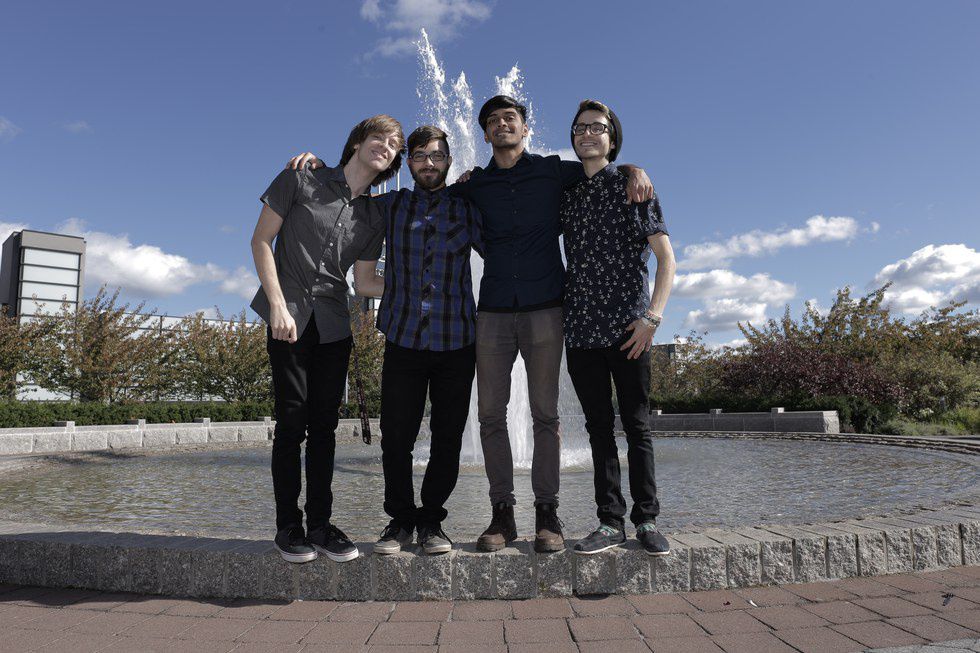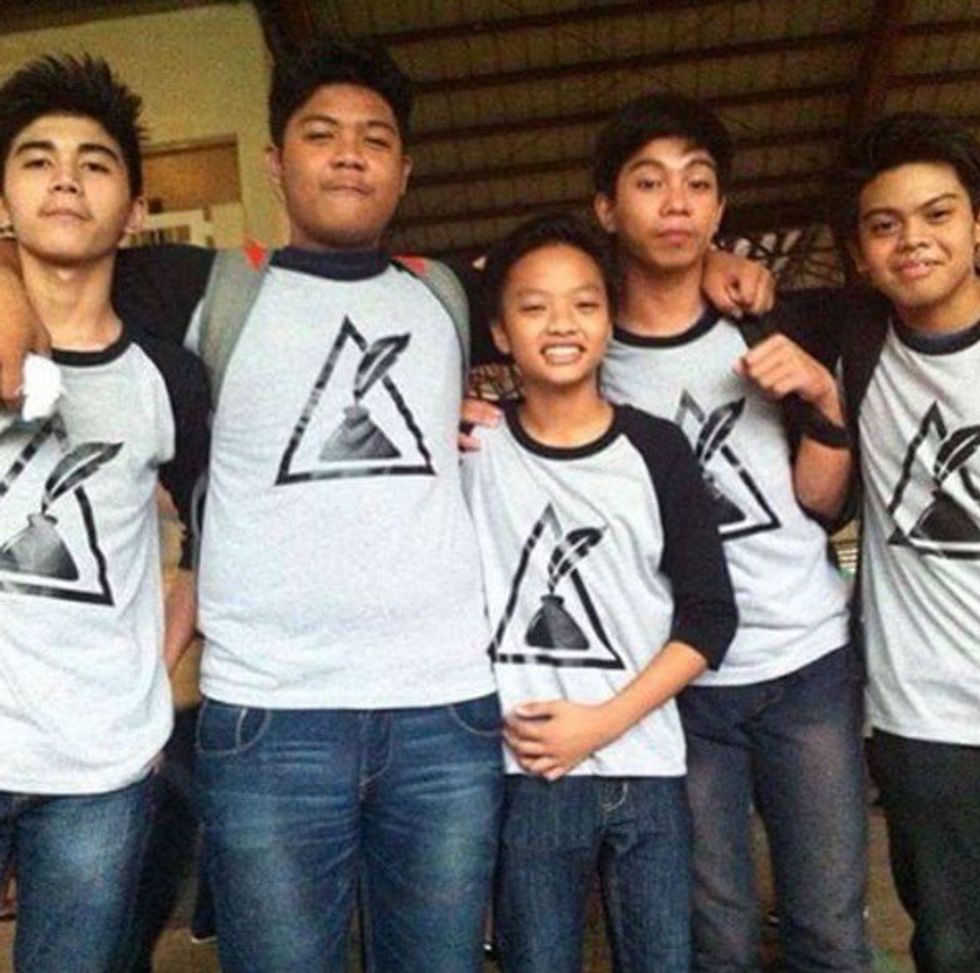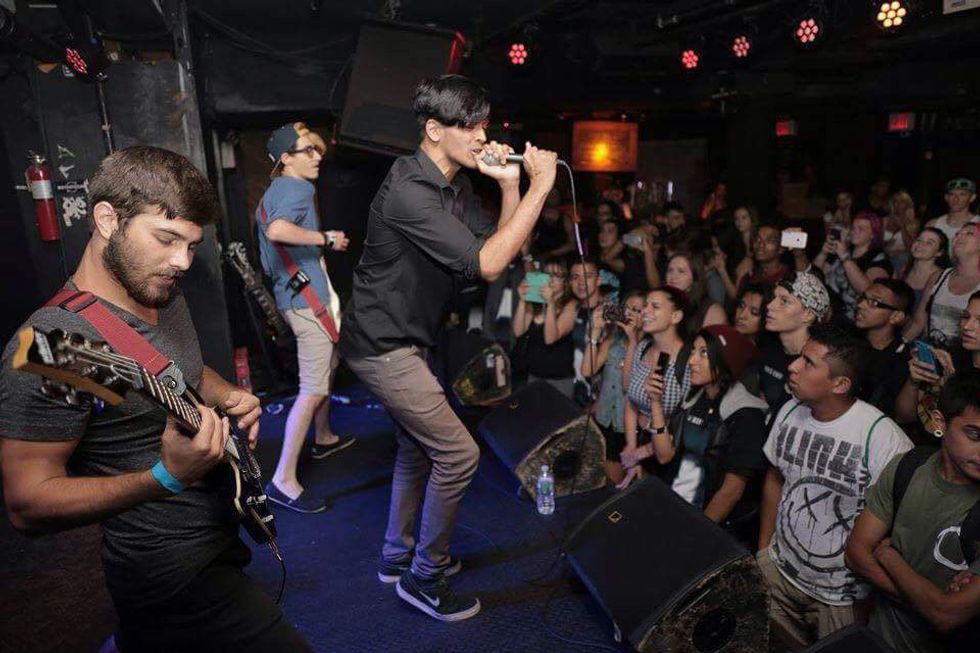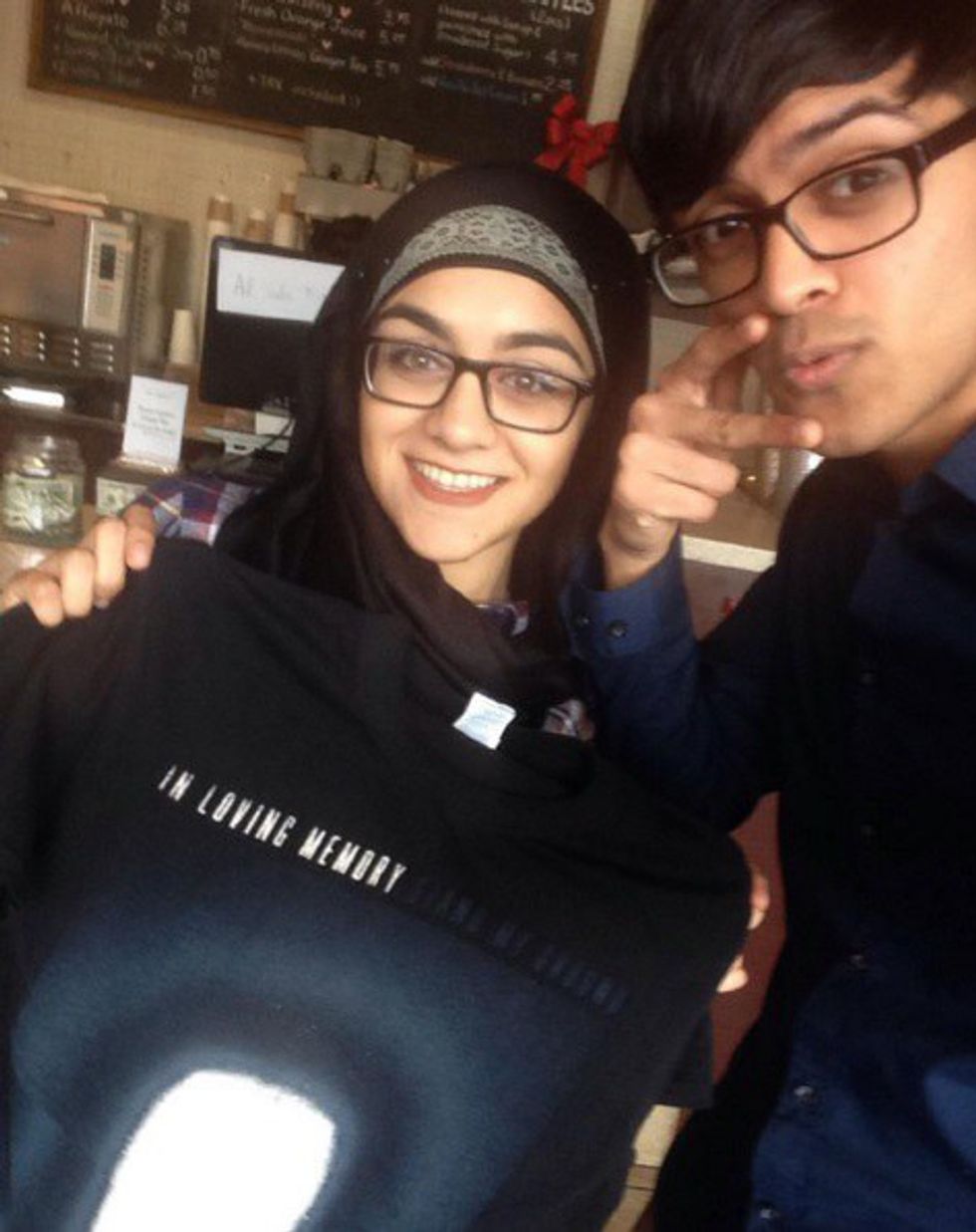Naveed Stone is definitely one of the most hardworking musicians I’ve ever come to know. I had the opportunity to sit down and talk to him about his upcoming career with his band In Loving Memory.
With over 10,000 likes on Facebook and more than 6,000 subscribers on YouTube, ILM is quickly gaining momentum. However, not everyone realizes how much of a struggle it is to strive for a music career as a first generation South Asian American.
Naveed Stone gives us insight into what it’s like to be a person of color in a predominantly white industry, and let me tell you: It ain’t easy.
1. Tell us a bit about yourself.
My name is Naveed Stone. I grew up right here in Queens, New York (Woodside). I go to Stony Brook University in Long Island. I’m in my junior year right now. I’m an engineering science major with a mechanical specialization, and that’s just a little bit about me.
2. What is In Loving Memory?
In Loving Memory originally started out as a solo project that I had. I was just writing a bunch of songs when I was around 16 years old and I was like, “You know what? I have the means to record these songs, so why not?” I would describe our music to be as if pop and metal had a baby, but back when I started the project I was just making vocal covers on YouTube trying to get myself out there until I found the right musicians to turn the project into a full band, and oddly enough, those guys ended up finding me around summer of 2014. Those guys are currently my band mates: Thomas Diognardi, Jon Conway and Vito Racanelli.
They found me through my YouTube videos and they reached out to me because they were previously in a band together and wanted a new vocalist. I checked them out and I thought, “You know what? These are the guys I’ve been looking for.” They actually came to my dorm at Stony Brook to meet me and we just jammed on acoustic guitars. We were like [to each other], “Do you know how to play that song? Cool, let’s jam." It was really cool because we were just jamming outside and there were kids walking by like, “Hey, are you guys in a band?” and we were like, “Umm, not really, but I think we will be?” It was really funny to see that we already had that chemistry the day we all met, and that’s how it started.
3. How did you get into this genre of music specifically?
I guess what started getting me really passionate about songwriting were bands like the Plain White T’s, All Time Low, Boys Like Girls, etc. I remember hearing the song “Hey There Delilah” by the Plain White T’s when it came out around 2007. That was when it really hit me. One man and his guitar can make something so beautiful, and that’s what made me want to pick up my guitar more and explore songwriting. I got into metal and similar genres through bands like Avenged Sevenfold. Eventually I found bands like Asking Alexandria, ISSUES, Sleeping With Sirens, Pierce The Veil, Black Veil Brides, and even more progressive bands like Periphery. Mainly, the thing about music these days is that everything revolves around the internet. With the internet you have access to everything, so most of the music I found was just from, you know, finding one song I liked and then clicking around. “Oh, what’s in the related videos?” and then next thing you know, I have so many new bands to listen to.
4. When did you start pursuing your music career and why?
Throughout my high school years I was just sort of making music and figuring out how to do it. It was definitely a budding passion I had, but it didn’t really occur to me that I could legitimately start pursuing it as a career until In Loving Memory became a full band in October of 2014. That was when we really started to approach it as our business and started thinking with that mindset.
5. Has In Loving Memory achieved any milestones?
I would definitely say we have. We’ve only been a band for a little bit more than a year now and if you want to go by numbers, our Facebook page has over 10,000 likes and our YouTube channel has over 6,000 subscribers. I guess we’re getting some momentum, which is awesome to see. Obviously we’re always going to try to push ourselves to be better, but it’s crazy because with the way we approach our band, a lot of our work is done online through social media and through our YouTube videos. We have fans scattered from all over and because of that it’s very easy to feel like we’re not making any impact since we don’t immediately see it around us. However, one of our biggest milestones was when we received a picture from five young fans that we have in the Philippines. They went out and made baseball tees with our band’s logo on them, and that blew our minds. They made merch for our band before we even had merch in the first place! The baseball tees that we sell now were inspired by that design.
It’s crazy because things like that really show us that we’re connecting with people around the world. Obviously, you know, there aren’t millions of people listening to our music everywhere you go but they are out there and they are showing a deeper level of connection to our music and that’s all we can ask for. Another big milestone for us was playing at Webster Hall the day after the release of our debut EP “Stand My Ground” back in August. I certainly did not expect to see people singing along to these songs that came out only the day before. It was definitely our best show.
6. What challenges have you faced surrounding your music?
I guess I’ll start with family because my biggest struggle is definitely being a Bengali American coming from a traditional South Asian background. My parents immigrated here with the expectations of, “Oh, you know, my son is going to become a doctor, an engineer, whatever the case may be, I’m going to make sure he pursues his education, pursues a lifestyle of stability and security,” because that’s what our culture places such high value on, and here I am trying to pursue a lifestyle of being a musician, which is the exact opposite of stability. Being a musician, you have to be ready to spend years at a time being in the pursuit of a dream. You have to be ready to not have that security. You have to be ready to live your entire life being spontaneous, and I guess because I grew up with that more traditional mindset, it’s hard for me to really adapt into such a different lifestyle. Now I’m at a point in my life where I’m investing so much in my academics but also my band; I’m sort of in the middle of those two extremes. I’m in the middle of wanting that stable lifestyle with security and also in the middle of wanting that reckless, youthful life of excitement and, you know, not giving a f***. With academics, obviously I definitely don’t intend to drop out of school. I’ve always taken my academics very seriously. I went to Stuyvesant High School, the number one public high school in New York City. So naturally I went through most of my life thinking, “Yeah, I’m going to take my education all the way. Why not?” To suddenly start having to shift gears and think, “Hmm, maybe I’m really going to take this dream that I have and actually go for it,” can be hard. It can be hard to adjust that mindset sometimes but I guess for now I’m just trying to balance both to the best of my ability. There have been shows that my band has played where I’m studying in the car ride for a test that I have the next day. One time I remember playing a show in Brooklyn and I wasn’t even watching the other bands play. I was sitting at the bar in the venue studying while other bands were playing. It can get stressful but I feel like because of the way I was raised, obviously I do value my education. I don’t discourage anybody from pursuing it, but at the same time I feel like if you manage your time, it’s amazing what you can do. It’s an ongoing struggle, but I try to get a better grip on it every day.
My biggest struggle when it comes to working with other musicians was really to find the right musicians to pursue my vision with. What the band is doing now, I’ve envisioned for years to be honest. After playing with and working with different musicians throughout New York City, I just couldn’t find that with the right people so I thought, “You know what? I’m gonna take it into my own hands and I’m gonna make music on my own until the right people find me.” With the power of the internet it’s crazy to see there are bands with members from different countries. The industry has changed so much just because of the accessibility of resources that everybody has now. I’m really fortunate that it took a lot less time than I thought it would for the right people to find me, and surely enough all my band members live in Long Island, so they’re not thousands of miles away from me. I guess that was the biggest struggle. But just from working and trying to get my own name out there, it ended up resolving itself.
7. What do you think about being a person of color in a predominantly white industry?
It can definitely be discouraging at times because it’s no secret that image is a huge part of what can make or break a band or anybody in the entertainment industry. It’s really discouraging to see that almost every leading actor or actress is somebody who’s white. I feel like it’s something that’s definitely not limited to music but the entertainment industry in general. That’s why I take a big influence from entertainers such as Aziz Ansari and YouTubers such as Karim Metwaly from Are We Famous Now, and FouseyTube. All these great actors and entertainers who are representing different demographics and different ethnicities show that it doesn’t have to be that way. I feel like, slowly, our society is progressing towards that point where not every entertainment industry has to be white-dominated. I can only hope that by me pursuing music and trying to be the frontman for a rock band, it can definitely open some eyes too.
8. Why do you think there is a lack of diversity in this music scene?
From my own experience, I know I’ve grown up with so many kids from different backgrounds, and what they usually have in common is that first generation Americans are raised by parents who limit their mindset in terms of what they can do with their lives. They tell their kids from an early age, “You’re not meant to do this.” With me especially, since day one, my parents have said, “You can’t do this. Why are you trying to pursue music? Only rich people can make it. Only white people can make it. Only good looking people can make it.” It’s very discouraging to hear things like that from my own parents, but at the same time I can’t blame them for thinking that way because that’s what their culture taught them. You know, our parents have all these cultural values and expectations and yeah that’s cool and all, but a lot of it just doesn’t apply when you’re raising an American child… in America! That’s what I feel causes that disconnect between many first generation Americans and their parents. That’s why, for most of my life, I only thought of music as a hobby. That’s all it could ever be, and that’s probably what so many other kids like me grow up thinking and hence, never even try to pursue it, but that’s a big reason why I want to be the first Bengali-American to really put my face out there in the music industry. If I can make it through this struggle and see the other side of it, I'll be in a position where I can show kids that this can be done before their parents tell them that it can't.
9. What do you think we can do about it?
I think the most important thing to really bring about any kind of social change, granted the struggles of a first generation American are not necessarily up there with homophobia, racism, or all these other social issues that get so much spotlight, is that it’s definitely something that needs more light shed on it. Think of how many children in America are affected by this. It’s an issue that’s completely underrepresented in the music industry. Why? Because the industry is dominated by mostly white people who you can assume are not first generation Americans, and therefore don’t necessarily understand what it’s like to grow up constantly at war with different cultural values. I think that the best way to bring about change in that regard is to start with the youngest generation. Empower the next generation. Empower the youth to really take the reins on steering where our society goes. It doesn’t have to just be limited to music and entertainment. It can be in any facet of society.
10. Why should anyone check out In Loving Memory?
Especially nowadays in the music industry, so many people rely on their image or gimmicks or things like that to get noticed, but the foundation of our band has always been the art of songwriting. Every single one of us in the band have dedicated so many years to our respective instruments before we even got together. I can honestly say that with all the musicians that I have met throughout the years, my guys are simply the best at what they do and they feel the same way about me. That’s what I think is going to be our mission statement. We’re here for one reason and one reason only: To create something that’s new, something that’s genuine. We want to be part of where the future of rock and metal (and even pop) is all going, part of that next generation of artists that really steer the music scene into its future. What makes me feel like we’re doing something right is when I show our music to my friends (or just any person who normally doesn’t listen to our type of music) and they might say, “Oh, this isn’t for me, but I respect what you guys are doing and I can see why others would like it.” That’s exactly the type of band we want to be. You don’t necessarily have to like us but we would want you to respect what we’re doing and be able to say, “You know what, those guys are good at what they do.”
Naveed and I ended the interview by talking about the future of the band. Needless to say, In Loving Memory is onto something that’ll blow everyone’s minds. Their music is a catchy blend of pop and metal; it’s something that’ll have listeners immediately hooked. You can stream their debut EP “Stand My Ground” here and check out their online store here. I’ve done both and have been a fan of this band for a while. Naveed and I are always standing our ground.
You can also subscribe to Naveed’s YouTube channel and In Loving Memory’s YouTube channel here and here, respectively. If this amazing, hard-working band can accomplish so much in just over a year, think about where they’ll be in a year or two from now. Despite the struggles of being a person of color in a predominantly white industry, Naveed Stone is destined for greatness.










 Energetic dance performance under the spotlight.
Energetic dance performance under the spotlight. Taylor Swift in a purple coat, captivating the crowd on stage.
Taylor Swift in a purple coat, captivating the crowd on stage. Taylor Swift shines on stage in a sparkling outfit and boots.
Taylor Swift shines on stage in a sparkling outfit and boots. Taylor Swift and Phoebe Bridgers sharing a joyful duet on stage.
Taylor Swift and Phoebe Bridgers sharing a joyful duet on stage.












